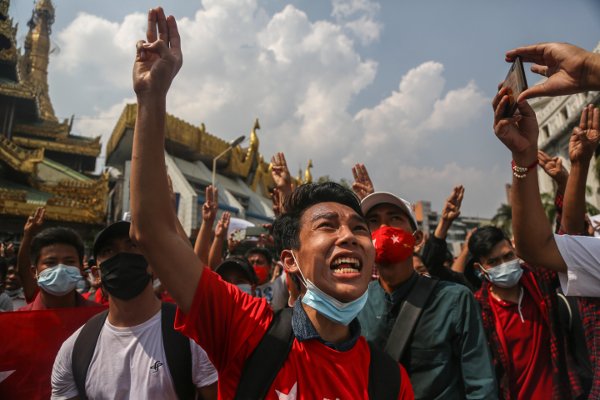If the 10-member states of the Association of Southeast Asian Nations were to choose between US and China, it’s a 7-3 win by China, according to “The State of Southeast Asia: 2020 Survey Report” published by the ASEAN Studies Centre at ISEAS-Yusof Ishak Institute in Singapore.
But even with countries that support the alignment with the US – Vietnam, the Philippines, and Singapore, the US enjoyed only a narrow edge over China as the region’s most-preferred ally.
“In a hypothetical sense, if ASEAN were to choose between China and the US, who would it opt to align itself with? The majority of respondents from seven ASEAN member states choose to align their country with China: Laos (73.9 percent), Brunei (69.1 percent), Myanmar (61.5 percent), Malaysia (60.7 percent), Cambodia (57.7 percent), Thailand (52.1 percent), and Indonesia (52 percent),” the survey said.
Data also showed that while 53.6 percent of the respondents are comfortable leaning towards the US, “there is a strong trust deficit towards the US since among the respondents who pick the US as the most influential political and strategic power, only 52.7 percent welcome Washington in the region.” And over-all, the region sees China as the most influential power in Southeast Asia economically, politically and strategically.
Support for alignment with China accounts for 46.4 percent, but those who believe that China is now the most influential economic power in the region was 79.2 percent, and more than half of the respondents (52.2 percent) think it has the most strategic and political influence in Southeast Asia.
According to the survey, the region’s confidence in the US is low “with 47 percent having little or no confidence in the US as a strategic partner and provider of regional security.” And this political clout in Southeast Asia dipped from 30.5 percent in 2019 to 26.7 percent in 2020 as 77 percent of the respondents observe that US engagement with Southeast Asia has declined under the Trump administration compared to the Obama administration.
To the further discomfort of the US, additional findings show that the percentage of the respondents who choose the US (26.7 percent) as the most influential political-strategic player is only half of the 52.2 percent of those who think it’s China.
“ASEAN member states have purportedly hedged against the uncertainties of the US-China rivalry through an opportunistic approach of active engagement with the two major powers. They also seek to expand ASEAN’s strategic options beyond the US-China duo. Japan (38.2 percent), the EU (31.7 percent) and Australia (8.8 percent) stand out as the region’s most preferred and trusted strategic partners,” the survey revealed.
But such recognition of China’s influence in the region is not without concern, an overwhelming concern that is at 85.4 percent. “It bears reminding that recognizing China’s power is not the same as accepting the new reality. In fact, if not handled with due diligence, this may elicit counter-balancing forces to prevent China from becoming the region’s hegemon,” the report added.
This concern can be gleaned from how respondents from only two of the 10 ASEAN members – the Philippines at 82.5 percent and from Vietnam at 88.2 percent, still consider military tensions arising from flashpoints such as the South China Sea as a top security threat. But survey showed that such concern is not among the top three security challenges facing Southeast Asia.
Philippines and Vietnam are two of four ASEAN claimant states with overlapping claims to the oil-rich cluster of isles in the South China Sea. Other claimants include Malaysia, Brunei, and they are locking heads in a territorial dispute with each other, and also together against China.
Domestic political instability, including ethnic and religious tensions, is considered the biggest concern in the region at 70.5 percent. Concerns about an economic downturn came second at 68.5percent, while climate change continues to gain traction in the region as 66.8 percent and is placed above the threat of increased military tensions arising from flashpoints such as the territorial dispute in the South China Sea (49.6 percent), and even higher than terrorism at 44.6 percent.
For respondents from Brunei, Laos, the Philippines, and Vietnam, they ranked climate change
second in their security concern barometer. Climate change as a “serious and immediate threat to well-being” is a strong sentiment in Indonesia at 71 percent, Vietnam at 61.2 percent, and the Philippines at 65 percent. Overall, while 52.4 percent of the respondents believe that their respective governments recognize climate change as a pressing security concern, “they are not convinced that their governments have not allocated resources to address them.”
This 2020 edition of the State of Southeast Asia survey was released last week by the ASEAN Studies Center of ISEAS-Yusof Ishak Institute (formerly Institute of Southeast Asian Studies). The online survey was conducted from 12 November to 1 December 2019. A total of 1,308 respondents took part in the survey and they come from five professional categories: research, business and finance, public sector, civil society, and the media in the ten ASEAN member states.
The regional study center maintains that “the survey findings are not meant to be representative of the extant Southeast Asian view on regional affairs but serve to present a general view of the prevailing attitudes among those in a position to inform or influence policy in ten ASEAN member states on regional political and economic issues.”



